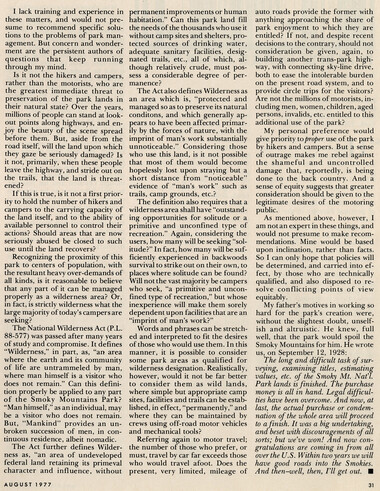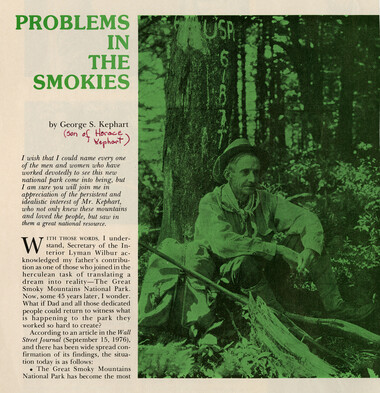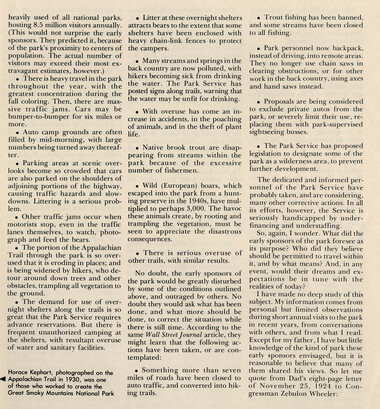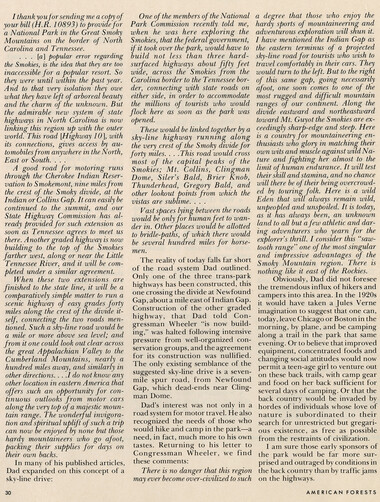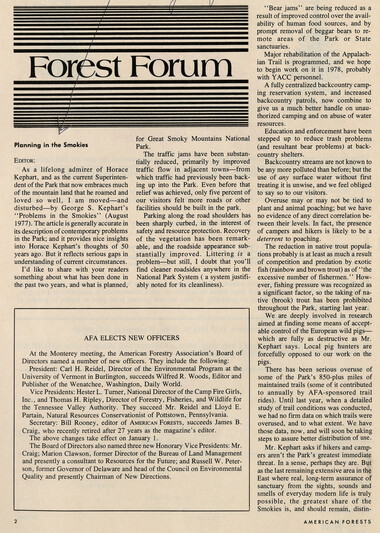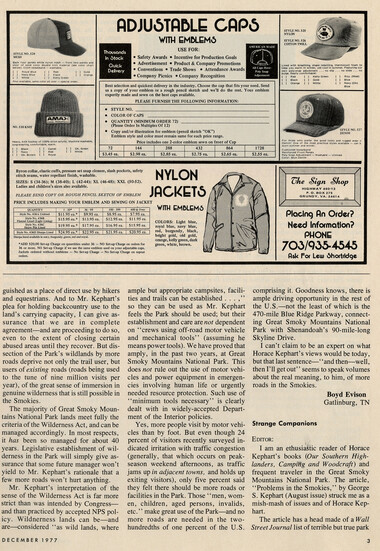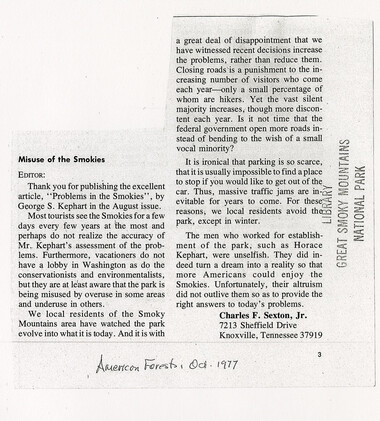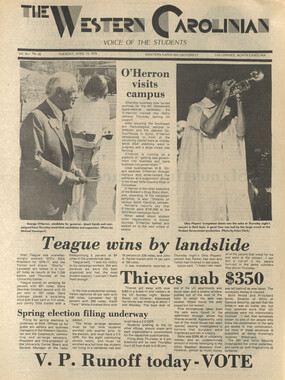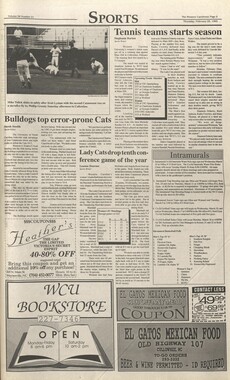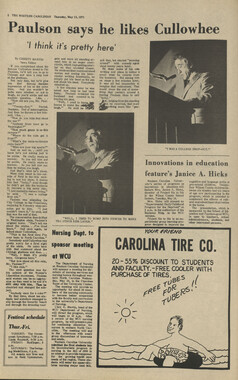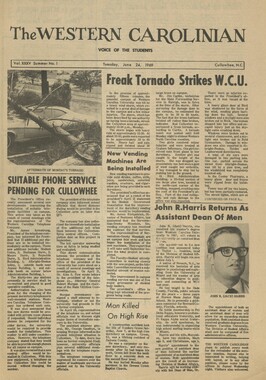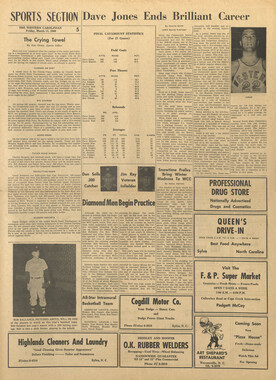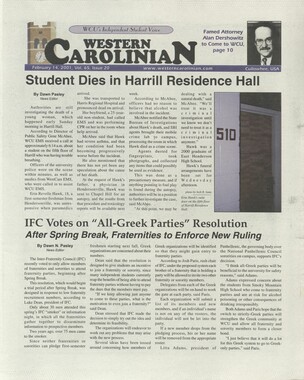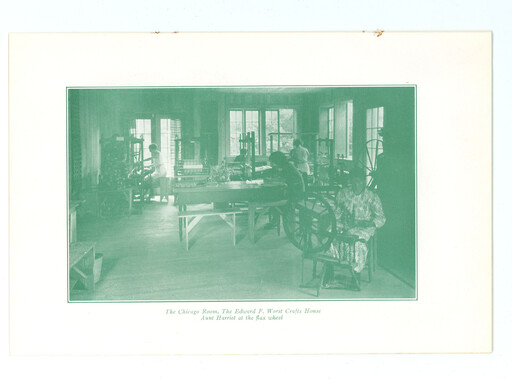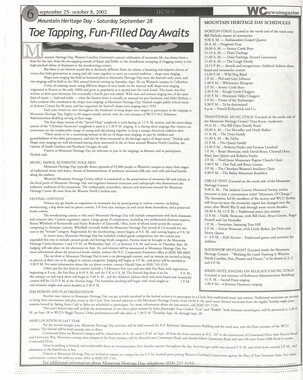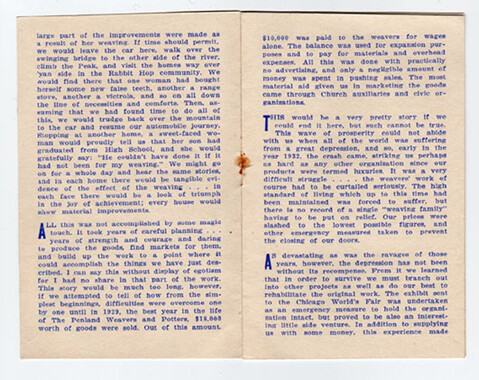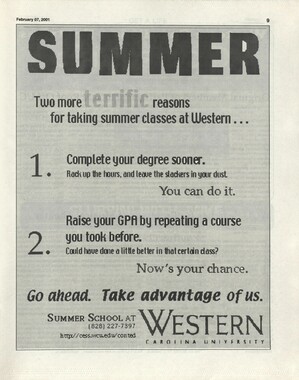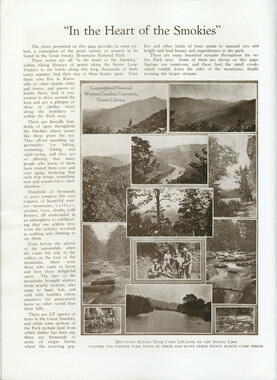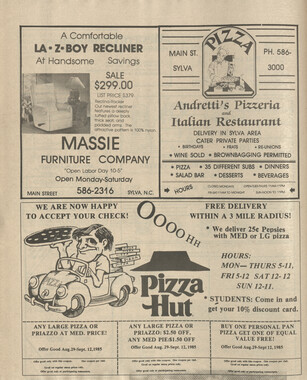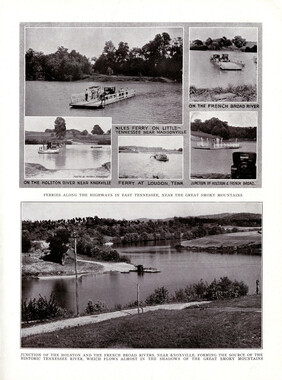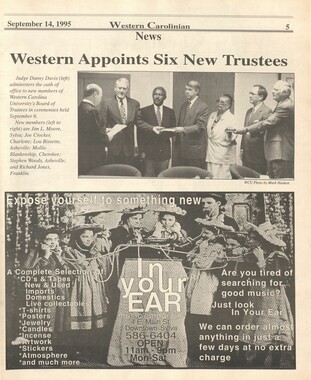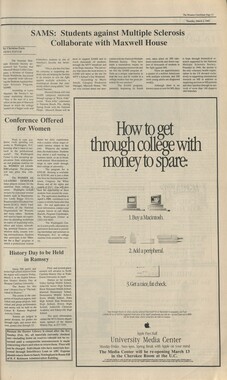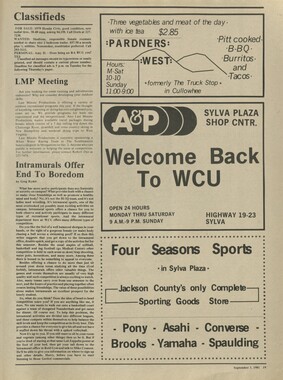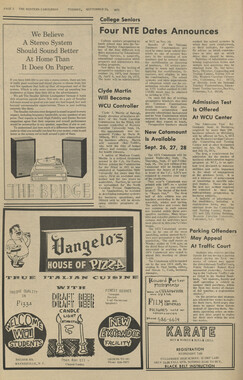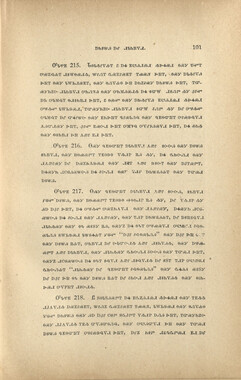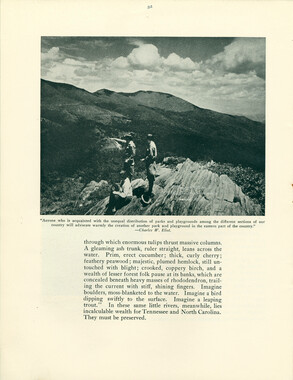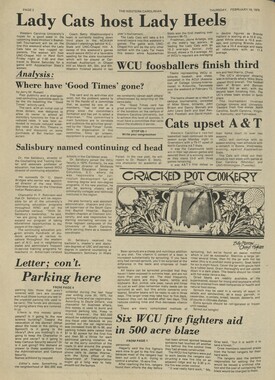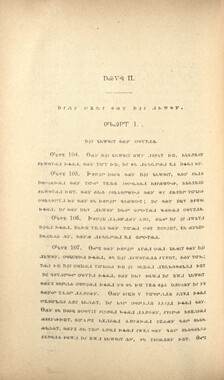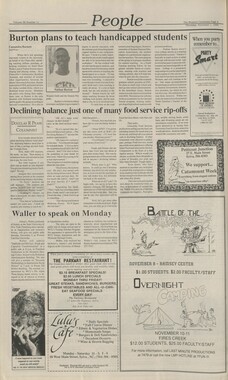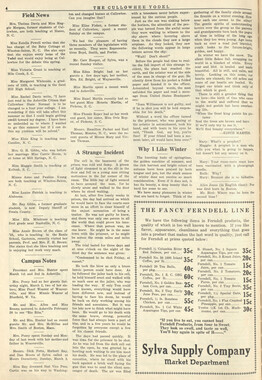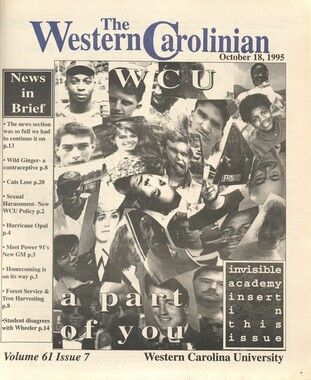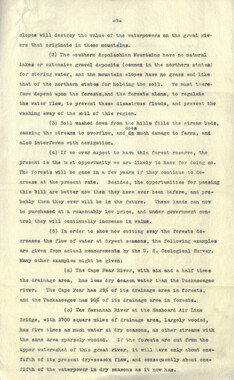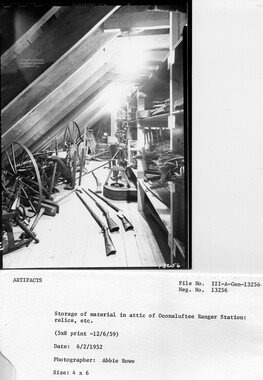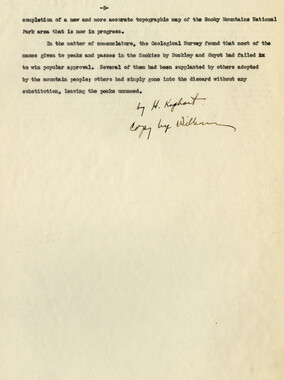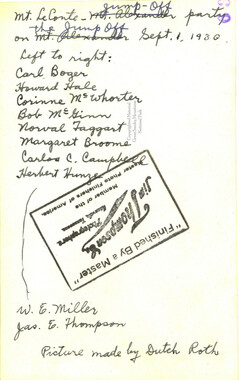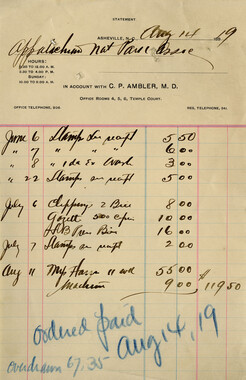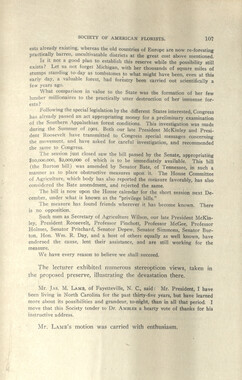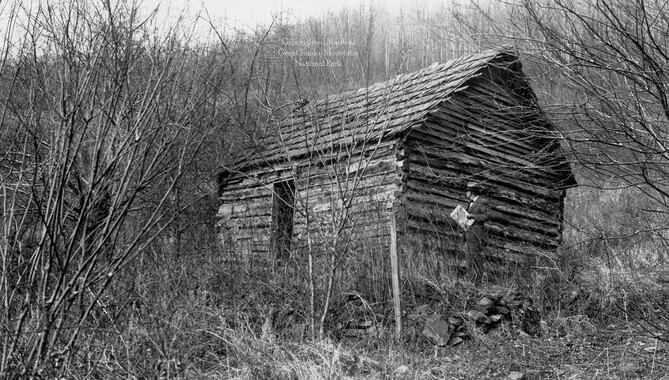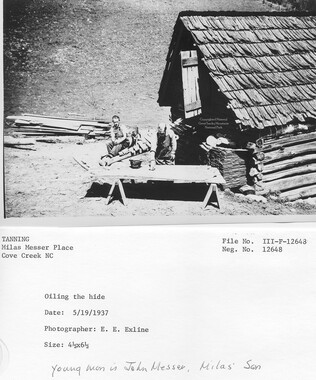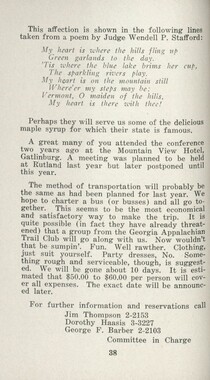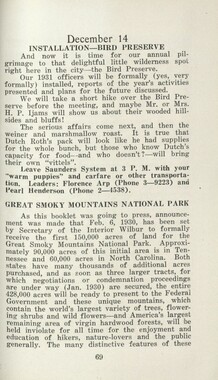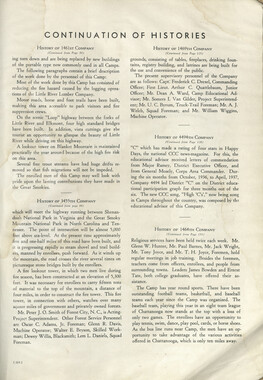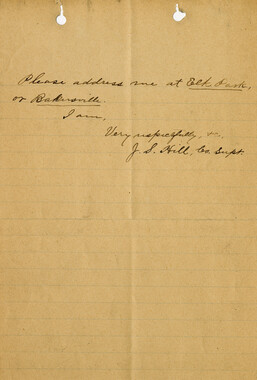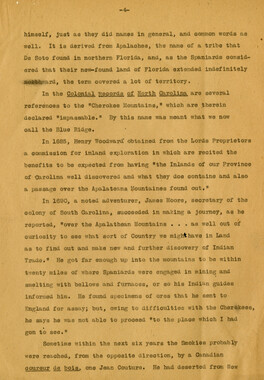Western Carolina University (20)
View all
- Canton Champion Fibre Company (2308)
- Cherokee Traditions (293)
- Civil War in Southern Appalachia (165)
- Craft Revival (1942)
- Great Smoky Mountains - A Park for America (2767)
- Highlights from Western Carolina University (430)
- Horace Kephart (941)
- Journeys Through Jackson (154)
- LGBTQIA+ Archive of Jackson County (19)
- Oral Histories of Western North Carolina (314)
- Picturing Appalachia (6679)
- Stories of Mountain Folk (413)
- Travel Western North Carolina (160)
- Western Carolina University Fine Art Museum Vitreograph Collection (129)
- Western Carolina University Herbarium (92)
- Western Carolina University: Making Memories (708)
- Western Carolina University Publications (2283)
- Western Carolina University Restricted Electronic Theses and Dissertations (146)
- Western North Carolina Regional Maps (71)
- World War II in Southern Appalachia (131)
University of North Carolina Asheville (6)
View all
- Appalachian National Park Association (53)
- Berry, Walter (76)
- Champion Fibre Company (5)
- Fromer, Irving Rhodes, 1913-1994 (70)
- Grant, George Alexander, 1891-1964 (96)
- Kephart, Horace, 1862-1931 (23)
- Masa, George, 1881-1933 (17)
- North Carolina Park Commission (105)
- Roth, Albert, 1890-1974 (142)
- Schenck, Carl Alwin, 1868-1955 (1)
- Stearns, I. K. (2)
- Thompson, James Edward, 1880-1976 (45)
- Weaver, Zebulon, 1872-1948 (55)
- Wilburn, Hiram Coleman, 1880-1967 (72)
- Allanstand Cottage Industries (0)
- Bennett, Kelly, 1890-1974 (0)
- Brasstown Carvers (0)
- Cain, Doreyl Ammons (0)
- Carver, George Washington, 1864?-1943 (0)
- Cathey, Joseph, 1803-1874 (0)
- Champion Paper and Fibre Company (0)
- Cherokee Indian Fair Association (0)
- Cherokee Language Program (0)
- Crittenden, Lorraine (0)
- Crowe, Amanda (0)
- Edmonston, Thomas Benton, 1842-1907 (0)
- Ensley, A. L. (Abraham Lincoln), 1865-1948 (0)
- George Butz (BFS 1907) (0)
- Goodrich, Frances Louisa (0)
- Heard, Marian Gladys (0)
- Kephart, Calvin, 1883-1969 (0)
- Kephart, Laura, 1862-1954 (0)
- Laney, Gideon Thomas, 1889-1976 (0)
- McElhinney, William Julian, 1896-1953 (0)
- Niggli, Josephina, 1910-1983 (0)
- Osborne, Kezia Stradley (0)
- Owens, Samuel Robert, 1918-1995 (0)
- Penland Weavers and Potters (0)
- Rhodes, Judy (0)
- Roberts, Vivienne (0)
- Sherrill's Photography Studio (0)
- Smith, Edward Clark (0)
- Southern Highland Handicraft Guild (0)
- Southern Highlanders, Inc. (0)
- Stalcup, Jesse Bryson (0)
- United States. Indian Arts and Crafts Board (0)
- USFS (0)
- Vance, Zebulon Baird, 1830-1894 (0)
- Western Carolina College (0)
- Western Carolina Teachers College (0)
- Western Carolina University (0)
- Western Carolina University. Mountain Heritage Center (0)
- Whitman, Walt, 1819-1892 (0)
- Williams, Isadora (0)
- 1810s (1)
- 1840s (1)
- 1850s (2)
- 1860s (3)
- 1870s (4)
- 1880s (7)
- 1890s (64)
- 1900s (294)
- 1910s (227)
- 1920s (461)
- 1930s (1585)
- 1940s (82)
- 1950s (15)
- 1960s (13)
- 1970s (47)
- 1980s (14)
- 1990s (17)
- 2000s (31)
- 2010s (1)
- 1600s (0)
- 1700s (0)
- 1800s (0)
- 1820s (0)
- 1830s (0)
- 2020s (0)
- Appalachian Region, Southern (80)
- Asheville (N.C.) (1)
- Avery County (N.C.) (6)
- Blount County (Tenn.) (159)
- Buncombe County (N.C.) (204)
- Cherokee County (N.C.) (10)
- Clay County (N.C.) (3)
- Graham County (N.C.) (108)
- Great Smoky Mountains National Park (N.C. and Tenn.) (416)
- Haywood County (N.C.) (263)
- Henderson County (N.C.) (13)
- Jackson County (N.C.) (58)
- Knox County (Tenn.) (21)
- Knoxville (Tenn.) (11)
- Lake Santeetlah (N.C.) (10)
- Macon County (N.C.) (25)
- Madison County (N.C.) (14)
- McDowell County (N.C.) (5)
- Mitchell County (N.C.) (7)
- Polk County (N.C.) (2)
- Qualla Boundary (22)
- Rutherford County (N.C.) (16)
- Swain County (N.C.) (516)
- Transylvania County (N.C.) (36)
- Watauga County (N.C.) (2)
- Waynesville (N.C.) (2)
- Yancey County (N.C.) (34)
- Aerial Views (3)
- Articles (1)
- Artifacts (object Genre) (4)
- Clippings (information Artifacts) (77)
- Drawings (visual Works) (174)
- Envelopes (2)
- Financial Records (9)
- Fliers (printed Matter) (34)
- Guidebooks (1)
- Interviews (11)
- Land Surveys (102)
- Letters (correspondence) (219)
- Manuscripts (documents) (91)
- Maps (documents) (69)
- Memorandums (14)
- Minutes (administrative Records) (20)
- Negatives (photographs) (282)
- Newsletters (12)
- Paintings (visual Works) (1)
- Pen And Ink Drawings (1)
- Photographs (1657)
- Portraits (39)
- Postcards (15)
- Publications (documents) (107)
- Scrapbooks (3)
- Sound Recordings (7)
- Speeches (documents) (11)
- Transcripts (46)
- Aerial Photographs (0)
- Albums (books) (0)
- Biography (general Genre) (0)
- Cards (information Artifacts) (0)
- Crafts (art Genres) (0)
- Depictions (visual Works) (0)
- Design Drawings (0)
- Facsimiles (reproductions) (0)
- Fiction (general Genre) (0)
- Glass Plate Negatives (0)
- Internegatives (0)
- Newspapers (0)
- Occupation Currency (0)
- Periodicals (0)
- Personal Narratives (0)
- Plans (maps) (0)
- Poetry (0)
- Programs (documents) (0)
- Questionnaires (0)
- Sheet Music (0)
- Slides (photographs) (0)
- Specimens (0)
- Text Messages (0)
- Tintypes (photographs) (0)
- Video Recordings (physical Artifacts) (0)
- Vitreographs (0)
- Appalachian National Park Association Records (336)
- Carlos C. Campbell Collection (282)
- Cataloochee History Project (65)
- George Masa Collection (89)
- Hiram C. Wilburn Papers (28)
- Historic Photographs Collection (236)
- Horace Kephart Collection (126)
- Humbard Collection (33)
- Jim Thompson Collection (44)
- Love Family Papers (11)
- Map Collection (12)
- R.A. Romanes Collection (10)
- Smoky Mountains Hiking Club Collection (616)
- Zebulon Weaver Collection (107)
- A.L. Ensley Collection (0)
- Appalachian Industrial School Records (0)
- Axley-Meroney Collection (0)
- Bayard Wootten Photograph Collection (0)
- Bethel Rural Community Organization Collection (0)
- Blumer Collection (0)
- C.W. Slagle Collection (0)
- Canton Area Historical Museum (0)
- Cherokee Studies Collection (0)
- Daisy Dame Photograph Album (0)
- Daniel Boone VI Collection (0)
- Doris Ulmann Photograph Collection (0)
- Elizabeth H. Lasley Collection (0)
- Elizabeth Woolworth Szold Fleharty Collection (0)
- Frank Fry Collection (0)
- Gideon Laney Collection (0)
- Hazel Scarborough Collection (0)
- Hunter and Weaver Families Collection (0)
- I. D. Blumenthal Collection (0)
- Isadora Williams Collection (0)
- Jesse Bryson Stalcup Collection (0)
- John B. Battle Collection (0)
- John C. Campbell Folk School Records (0)
- John Parris Collection (0)
- Judaculla Rock project (0)
- Kelly Bennett Collection (0)
- Major Wiley Parris Civil War Letters (0)
- McFee-Misemer Civil War Letters (0)
- Mountain Heritage Center Collection (0)
- Norburn - Robertson - Thomson Families Collection (0)
- Pauline Hood Collection (0)
- Pre-Guild Collection (0)
- Qualla Arts and Crafts Mutual Collection (0)
- Rosser H. Taylor Collection (0)
- Samuel Robert Owens Collection (0)
- Sara Madison Collection (0)
- Sherrill Studio Photo Collection (0)
- Stories of Mountain Folk - Radio Programs (0)
- The Reporter, Western Carolina University (0)
- Venoy and Elizabeth Reed Collection (0)
- WCU Gender and Sexuality Oral History Project (0)
- WCU Mountain Heritage Center Oral Histories (0)
- WCU Oral History Collection - Mountain People, Mountain Lives (0)
- WCU Students Newspapers Collection (0)
- Western North Carolina Tomorrow Black Oral History Project (0)
- William Williams Stringfield Collection (0)
- Appalachian Trail (22)
- Church buildings (9)
- Civilian Conservation Corps (U.S.) (91)
- Dams (21)
- Floods (1)
- Forest conservation (11)
- Forests and forestry (42)
- Great Smoky Mountains National Park (N.C. and Tenn.) (64)
- Hunting (2)
- Logging (25)
- Maps (74)
- North Carolina -- Maps (5)
- Postcards (15)
- Railroad trains (8)
- Sports (4)
- Storytelling (2)
- Waterfalls -- Great Smoky Mountains (N.C. and Tenn.) (39)
- African Americans (0)
- Artisans (0)
- Cherokee art (0)
- Cherokee artists -- North Carolina (0)
- Cherokee language (0)
- Cherokee pottery (0)
- Cherokee women (0)
- College student newspapers and periodicals (0)
- Dance (0)
- Education (0)
- Folk music (0)
- Forced removal, 1813-1903 (0)
- Gender nonconformity (0)
- Landscape photography (0)
- Mines and mineral resources (0)
- Paper industry (0)
- Pottery (0)
- Rural electrification -- North Carolina, Western (0)
- School integration -- Southern States (0)
- Segregation -- North Carolina, Western (0)
- Slavery (0)
- Weaving -- Appalachian Region, Southern (0)
- Wood-carving -- Appalachian Region, Southern (0)
- World War, 1939-1945 (0)
- Sound (7)
- StillImage (2172)
- Text (655)
- MovingImage (0)
Problems in the Smokies
Item
Item’s are ‘child’ level descriptions to ‘parent’ objects, (e.g. one page of a whole book).
-
-
I lack training and experience in these matters, and would not presume to recommend specific solutions to the problems of park management. But concern and wonderment are the persistent authors of questions that keep running through my mind. Is it not the hikers and campers, rather than the motorists, who are the greatest immediate threat to preservation of the park lands in their natural state? Over the years, millions of people can stand at lookout points along highways, and enjoy the beauty of the scene spread before them. But, aside from the road itself, will the land upon which they gaze be seriously damaged? Is it not, primarily, when these people leave the highway, and stride out on the trails, that the land is threatened? If this is true, is it not a first priority to hold the number of hikers and campers to the carrying capacity of the land itself, and to the ability of available personnel to control their actions? Should areas that are now seriously abused be closed to such use until the land recovers? Recognizing the proximity of this park to centers of population, with the resultant heavy over-demands of all kinds, is it reasonable to believe that any part of it can be managed properly as a wilderness area? Or, in fact, is strictly wilderness what the large majority of today's campers are seeking? The National Wilderness Act (P.L. 88-577) was passed after many years of study and compromise. It defines "Wilderness," in part, as, "an area where the earth and its community of life are untrammeled by man, where man himself is a visitor who does not remain." Can this definition properly be applied to any part of the Smoky Mountains Park? "Man himself," as an individual, may be a visitor who does not remain. But, "Mankind" provides an unbroken succession of men, in continuous residence, albeit nomadic. The Act further defines Wilderness as, "an area of undeveloped federal land retaining its primeval character and influence, without permanent improvements or human habitation." Can this park land fill the needs of the thousands who use it without camp sites and shelters, protected sources of drinking water, adequate sanitary facilities, designated trails, etc., all of which, although relatively crude, must possess a considerable degree of permanence? The Act also defines Wilderness as an area which is, "protected and managed so as to preserve its natural conditons, and which generally appears to have been affected primarily by the forces of nature, with the imprint of man's work substantially unnoticeable." Considering those who use this land, is it not possible that most of them would become hopelessly lost upon straying but a short distance from "noticeable" evidence of "man's work" such as trails, camp grounds, etc.? The definition also requires that a wilderness area shall have "outstanding opportunities for solitude or a primitive and unconfined type of recreation." Again, considering the users, how many will be seeking "solitude?" In fact, how many will be sufficiently experienced in backwoods survival to strike out on their own, to places where solitude can be found? Will not the vast majority be campers who seek, "a primitive and unconfined type of recreation," but whose inexperience will make them sorely dependent upon facilities that are an "imprint of man's work?" Words and phrases can be stretched and interpreted to fit the desires of those who would use them. In this manner, it is possible to consider some park areas as qualified for wilderness designation. Realistically, however, would it not be far better to consider them as wild lands, where simple but appropriate camp sites, facilities and trails can be established, in effect, "permanently," and where they can be maintained by crews using off-road motor vehicles and mechanical tools? Referring again to motor travel; the number of those who prefer, or must, travel by car far exceeds those who would travel afoot. Does the present, very limited, mileage of auto roads provide the former with anything approaching the share of park enjoyment to which they are entitled? If not, and despite recent decisions to the contrary, should not consideration be given, again, to building another trans-park highway, with connecting sky-line drive, both to ease the intolerable burden on the present road system, and to provide circle trips for the visitors? Are not the millions of motorists, including men, women, children, aged persons, invalids, etc. entitled to this additional use of the park? My personal preference would give priority to proper use of the park by hikers and campers. But a sense of outrage makes me rebel against the shameful and uncontrolled damage that, reportedly, is being done to the back country. And a sense of equity suggests that greater consideration should be given to the legitimate desires of the motoring public. As mentioned above, however, I am not an expert in these things, and would not presume to make recommendations. Mine would be based upon inclination, rather than facts. So I can only hope that policies will be determined, and carried into effect, by those who are technically qualified, and also disposed to resolve conflicting points of view equitably. My father's motives in working so hard for the park's creation were, without the slightest doubt, unselfish and altruistic. He knew, full well, that the park would spoil the Smoky Mountains for him. He wrote us, on September 12, 1928: The long and difficult task of surveying, examining titles, estimating values, etc. of the Smoky Mt. Nat'I. Park lands is finished. The purchase money is all in hand. Legal difficulties have been overcome. And now, at last, the actual purchase or condemnation of the whole area will proceed to a finish. It was a big undertaking, and beset with discouragements of all sorts; but we've won! And now congratulations are coming in from all over the U.S. Within two years we will have good roads into the Smokies. And then-well, then, I'll get out. ■ AUGUST 1 977 31
Object
Object’s are ‘parent’ level descriptions to ‘children’ items, (e.g. a book with pages).
-
“Problems in the Smokies” is an article written by George S. Kephart, son of Horace Kephart, in a 1977 issue of American Forests. In it, the younger Kephart details what he sees as problems in park management, including issues like traffic jams. Responses to the article, most notably by current park superintendent, argue that the article is misinformed. Horace Kephart (1862-1931) was a noted naturalist, woodsman, journalist, and author and promoter of the Great Smoky Mountains National Park.
-
